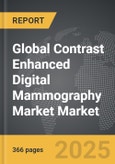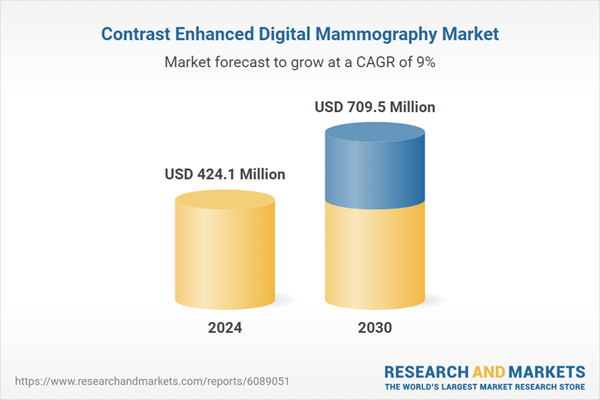Global Contrast Enhanced Digital Mammography Market - Key Trends & Drivers Summarized
Why Is Contrast Enhanced Digital Mammography Gaining Prominence in Breast Cancer Diagnostics?
Contrast Enhanced Digital Mammography (CEDM) is increasingly being adopted as a powerful diagnostic tool in breast imaging, offering enhanced sensitivity and specificity in detecting abnormalities, particularly in dense breast tissue. CEDM combines traditional digital mammography with the intravenous injection of iodinated contrast agents, allowing radiologists to visualize areas of increased blood flow - often associated with malignancy - through dual-energy imaging techniques. This approach bridges the diagnostic gap between standard mammography and breast MRI, delivering higher diagnostic accuracy at a fraction of the cost and scan time. With breast cancer being one of the most prevalent cancers among women globally, early and accurate detection is critical for improving patient outcomes and reducing mortality rates. CEDM offers a significant improvement over conventional mammography, particularly in patients with dense breasts, where overlapping tissues can obscure lesions. Its ability to highlight vascularized tumors makes it a valuable adjunct or alternative to MRI, especially in pre-surgical planning, high-risk screenings, and evaluation of treatment response. As awareness around breast cancer screening grows and healthcare systems emphasize early detection, CEDM is gaining traction as a clinically effective and economically viable solution across radiology departments and women's health centers worldwide.How Are Clinical Guidelines and Imaging Trends Supporting the Adoption of CEDM?
The expanding use of Contrast Enhanced Digital Mammography is closely linked to evolving clinical guidelines and broader imaging trends that emphasize precision, patient-centered care, and cost-effectiveness. Regulatory bodies and medical associations are increasingly recognizing the diagnostic value of CEDM, particularly in specific use cases such as evaluating inconclusive mammograms, screening high-risk populations, and serving as a viable alternative when MRI is contraindicated. For patients who are claustrophobic, have implanted medical devices, or face insurance barriers, CEDM provides a more accessible and tolerable imaging option. Furthermore, radiologists are integrating CEDM into multimodal diagnostic pathways, using it to complement ultrasound, MRI, and tomosynthesis for a more comprehensive assessment. As imaging centers modernize and expand their diagnostic capabilities, there is a growing push to adopt dual-purpose mammography systems that can perform both standard and contrast-enhanced scans with minimal operational adjustments. This compatibility helps reduce capital investment and training time while enhancing clinical workflow. With increasing emphasis on reducing false positives and avoiding unnecessary biopsies, CEDM's superior lesion conspicuity and lesion-to-background contrast are becoming vital tools in the radiologist's arsenal. As a result, healthcare providers are reevaluating their imaging protocols to incorporate CEDM into routine diagnostic and preoperative procedures, accelerating its integration into standard care.What Technological Advancements Are Enhancing the Performance and Accessibility of CEDM Systems?
Ongoing innovation in imaging technology, contrast agent formulation, and image processing software is significantly elevating the capabilities and accessibility of CEDM systems. Recent advances in dual-energy imaging allow simultaneous acquisition of low- and high-energy images, enabling the subtraction of background breast tissue and enhanced visualization of contrast uptake areas. This dual acquisition approach not only improves diagnostic accuracy but also reduces scan time and minimizes patient discomfort. Newer mammography units are now designed with integrated CEDM capabilities, allowing seamless transition between conventional and contrast-enhanced imaging modes. Software improvements, including AI-powered image interpretation and automated lesion detection, are further aiding radiologists in identifying subtle abnormalities with greater confidence and speed. Innovations in contrast agents are also enhancing safety and image quality, with lower doses and faster clearance profiles reducing the risk of adverse reactions. Additionally, as digital health ecosystems evolve, CEDM systems are being linked with cloud-based PACS (Picture Archiving and Communication Systems), enabling remote consultations and second opinions. Portable and compact systems are being explored for use in outpatient clinics and mobile screening units, broadening access to high-quality breast imaging in underserved or rural regions. Collectively, these technological enhancements are driving operational efficiency, improving diagnostic accuracy, and expanding the global reach of CEDM.What Are the Main Drivers Propelling the Growth of the Global CEDM Market?
The growth in the contrast enhanced digital mammography market is driven by a combination of clinical, economic, and technological factors aligned with the rising global burden of breast cancer and the need for improved diagnostic tools. A primary growth driver is the increasing incidence of breast cancer, particularly in younger women and in regions with limited access to early detection programs, where CEDM offers a practical and highly effective solution. Healthcare systems are seeking imaging modalities that provide better diagnostic accuracy without incurring the high costs and limited availability associated with MRI, making CEDM an attractive middle ground. The growing emphasis on personalized medicine and risk-based screening protocols is also fueling demand for advanced imaging techniques that can be tailored to individual patient profiles. From a reimbursement standpoint, as insurance policies evolve to cover CEDM procedures, adoption is expected to accelerate further in both public and private healthcare settings. The expansion of breast cancer awareness campaigns, particularly in developing countries, is creating new demand for affordable yet high-resolution diagnostic tools, and CEDM fits this need well. Moreover, hospital investments in next-generation imaging infrastructure and the integration of AI for diagnostic support are enhancing the clinical value and ROI of CEDM installations. These interlinked drivers are positioning contrast enhanced digital mammography as a key component of the future landscape of breast imaging.Report Scope
The report analyzes the Contrast Enhanced Digital Mammography market, presented in terms of market value (US$). The analysis covers the key segments and geographic regions outlined below:- Segments: Technique (Temporal Subtraction, Dual Energy CEDM); Application (Screening, Diagnosis); End-Use (Hospitals, Diagnostic Centers, Specialty Clinics, Other End-Uses).
- Geographic Regions/Countries: World; United States; Canada; Japan; China; Europe (France; Germany; Italy; United Kingdom; Spain; Russia; and Rest of Europe); Asia-Pacific (Australia; India; South Korea; and Rest of Asia-Pacific); Latin America (Argentina; Brazil; Mexico; and Rest of Latin America); Middle East (Iran; Israel; Saudi Arabia; United Arab Emirates; and Rest of Middle East); and Africa.
Key Insights:
- Market Growth: Understand the significant growth trajectory of the Temporal Subtraction Technique segment, which is expected to reach US$444.6 Million by 2030 with a CAGR of a 7.7%. The Dual Energy CEDM Technique segment is also set to grow at 11.3% CAGR over the analysis period.
- Regional Analysis: Gain insights into the U.S. market, valued at $115.5 Million in 2024, and China, forecasted to grow at an impressive 12.1% CAGR to reach $141.5 Million by 2030. Discover growth trends in other key regions, including Japan, Canada, Germany, and the Asia-Pacific.
Why You Should Buy This Report:
- Detailed Market Analysis: Access a thorough analysis of the Global Contrast Enhanced Digital Mammography Market, covering all major geographic regions and market segments.
- Competitive Insights: Get an overview of the competitive landscape, including the market presence of major players across different geographies.
- Future Trends and Drivers: Understand the key trends and drivers shaping the future of the Global Contrast Enhanced Digital Mammography Market.
- Actionable Insights: Benefit from actionable insights that can help you identify new revenue opportunities and make strategic business decisions.
Key Questions Answered:
- How is the Global Contrast Enhanced Digital Mammography Market expected to evolve by 2030?
- What are the main drivers and restraints affecting the market?
- Which market segments will grow the most over the forecast period?
- How will market shares for different regions and segments change by 2030?
- Who are the leading players in the market, and what are their prospects?
Report Features:
- Comprehensive Market Data: Independent analysis of annual sales and market forecasts in US$ Million from 2024 to 2030.
- In-Depth Regional Analysis: Detailed insights into key markets, including the U.S., China, Japan, Canada, Europe, Asia-Pacific, Latin America, Middle East, and Africa.
- Company Profiles: Coverage of players such as Accenture, ActiveFence, Alorica, Besedo, Checkstep and more.
- Complimentary Updates: Receive free report updates for one year to keep you informed of the latest market developments.
Some of the 36 companies featured in this Contrast Enhanced Digital Mammography market report include:
- Allengers Medical Systems Ltd.
- Analogic Corporation
- BMI Biomedical International S.R.L.
- Canon Medical Systems Corporation
- Carestream Health
- Fujifilm Holdings Corporation
- GE HealthCare
- Hitachi Medical Systems
- Hologic, Inc.
- iCAD, Inc.
- Konica Minolta, Inc.
- Nanjing Foinoe Co., Ltd.
- Philips Healthcare
- Planmed Oy
- Samsung Medison Co., Ltd.
- Shimadzu Corporation
- Siemens Healthineers AG
- Toshiba Medical Systems Corporation
- Trivitron Healthcare
- Ziehm Imaging GmbH
This edition integrates the latest global trade and economic shifts into comprehensive market analysis. Key updates include:
- Tariff and Trade Impact: Insights into global tariff negotiations across 180+ countries, with analysis of supply chain turbulence, sourcing disruptions, and geographic realignment. Special focus on 2025 as a pivotal year for trade tensions, including updated perspectives on the Trump-era tariffs.
- Adjusted Forecasts and Analytics: Revised global and regional market forecasts through 2030, incorporating tariff effects, economic uncertainty, and structural changes in globalization. Includes historical analysis from 2015 to 2023.
- Strategic Market Dynamics: Evaluation of revised market prospects, regional outlooks, and key economic indicators such as population and urbanization trends.
- Innovation & Technology Trends: Latest developments in product and process innovation, emerging technologies, and key industry drivers shaping the competitive landscape.
- Competitive Intelligence: Updated global market share estimates for 2025, competitive positioning of major players (Strong/Active/Niche/Trivial), and refined focus on leading global brands and core players.
- Expert Insight & Commentary: Strategic analysis from economists, trade experts, and domain specialists to contextualize market shifts and identify emerging opportunities.
Table of Contents
Companies Mentioned (Partial List)
A selection of companies mentioned in this report includes, but is not limited to:
- Allengers Medical Systems Ltd.
- Analogic Corporation
- BMI Biomedical International S.R.L.
- Canon Medical Systems Corporation
- Carestream Health
- Fujifilm Holdings Corporation
- GE HealthCare
- Hitachi Medical Systems
- Hologic, Inc.
- iCAD, Inc.
- Konica Minolta, Inc.
- Nanjing Foinoe Co., Ltd.
- Philips Healthcare
- Planmed Oy
- Samsung Medison Co., Ltd.
- Shimadzu Corporation
- Siemens Healthineers AG
- Toshiba Medical Systems Corporation
- Trivitron Healthcare
- Ziehm Imaging GmbH
Table Information
| Report Attribute | Details |
|---|---|
| No. of Pages | 366 |
| Published | January 2026 |
| Forecast Period | 2024 - 2030 |
| Estimated Market Value ( USD | $ 424.1 Million |
| Forecasted Market Value ( USD | $ 709.5 Million |
| Compound Annual Growth Rate | 9.0% |
| Regions Covered | Global |









